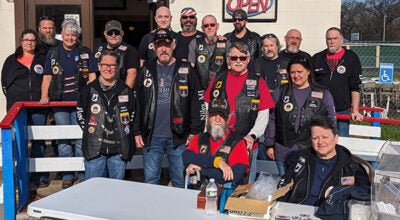Not forgotten
Published 7:09 pm Sunday, May 22, 2011

Edward Winchester, 37, died Jan. 22, 1945, serving his country during World War II and was buried in Epinal, France.
Saturday, May 21, his family and friends remembered him and commemorated his sacrifice on his homeland at a memorial ceremony attended by about 40 people at Sacred Heart Catholic Church on Leach Road in Silver Creek Township.
A stone cross was placed near Winchester’s family burial plot near Sister Lakes.
A family eagle staff the color guard advanced with the flags represents 95 veterans.
“Once we’re gone, no one will know his story,” said Gordon “Gus” Gwilt, Winchester’s half-brother and ceremony organizer. “With this stone cross, people will know who he was and what he did.”
Tribal leaders conducted sacred pipe and water ceremonies at the site where the cross was placed and offered Native hand drum songs.
Water “is the lifeblood of Mother Earth.” Women are life-givers, for which men respect them. “We are sorry for the way water has been treated in the past. We love this gift from the Creator. All living things require water. We don’t bless the water — the water blesses us. You can go a week or two without food, but you deteriorate quickly without water.”
Winchester was part of the heroic Third Infantry Division in Colmar Pocket, France.
His division, one of the most storied combat divisions in American military history, received the Presidential Unit Citation, given to an entire unit for gallantry in unusually difficult circumstances.
Heroism required is comparable to the Distinguished Service Cross, the second-highest medal for valor next to the Medal of Honor awarded by the U.S. Army.
They fought incessantly for 15 days in heavy snowstorms throughout enemy-infested marshes and woods and over a flat plain with little cover cris-crossed by numerous small canals, irrigation ditches and streams.
The assault on German defenses drove forward against mounting resistance.
A bridge thrown across the Rhine River collapsed before armor could pass to support battalions on the far side.
Isolated, outnumbered and outgunned by a Panzer brigade, these valiant troops were forced back yard by yard. Wave after wave of armor and infantry hurled against them, but despite hopeless odds, they crossed the canal during the night in rubber boats.
In what came to be known as one of the bloodiest campaigns of World War II, the Third Infantry Division annihilated three enemy divisions, partially destroyed three others, captured 4,000 prisoners and inflicted more than 7,500 casualties.
Pokagon Band Chairman Matt Wesaw said, “I believe Pvt. 1st Class Edward Winchester is a Pokagon warrior and a true hero for fighting in a foreign land so we may enjoy the freedoms we have here today. I hear the comment often, ‘All gave some and some gave all.’ We are here today to honor and remember one who gave all. The Battle of Colmar Pocket some call the ‘second Battle of the Bulge.’ It lasted 15 days in heavy snowstorms and the coldest temperatures in 50 years. I was not in the military, so the thing that strikes my heart and impresses me no end when I hear these stories was the bravery and intestinal fortitude shown against those hopeless odds.
“It was in this same tremendous and terrible battle that Audie Murphy’s heroism made him a Medal of Honor recipient. I will confess, I had never heard of Colmar Pocket before, and I’m not a military strategist, but in my opinion, that battle changed the war. The enemy they were fighting there was trying to break loose to reinforce the Germans in the Battle of the Bulge. If they had got through, who knows what would have happened? I publicly thank Edward Winchester, for it it wasn’t for heroes like him, where would we be today and what would our country look like?”






